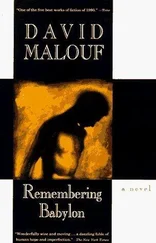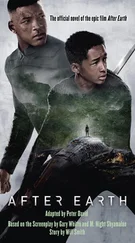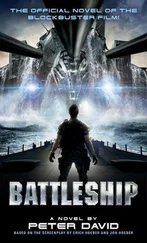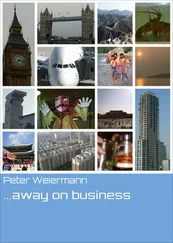It was Clancy who stepped between them, and before Jim knew quite what had happened it was Wizzer and Clancy who were slogging it out, but in a different spirit. Their violence was ordinary. They exchanged blows and insults and did and said all that was appropriate to such encounters, while other men gathered in a ring and cheered, but the occasion was not murderous as the earlier one had been. The others — all but Clancy — had backed away from that, recognizing a situation for which there were no rules.
The odd thing was that Wizzer seemed as relieved as Jim to have the moment defused.
Clancy, who ended up merely clowning, got a black eye out of it and for days after he teased Jim and refused to let the matter drop.
‘I’m wearing Jim Saddler’s black eye,’ he told people. But in no way suggested that Jim had ducked the issue; and nobody thought that. He had been ready enough to fight, ready even to kill.
Jim wondered about himself. When, afterwards, he left a wide circle round Wizzer Green, it wasn’t out of timidity but from a wish not to be confronted with some depth in himself, and in the other man, that frightened him and which he did not understand.
THEY WENT UP to Bailleul in cattle trucks, forty to a car. Eight horses or forty men the notice proclaimed. It seemed, even for the army, a rough equation and you wondered who had made it.
The loading took hours as the various companies were assembled beside their packs and then urged up into the wagons, the last men pushing in. It was cold at first, then hot, and the cars stank. Even after they had hung their packs up from hooks in the roof there wasn’t enough room for them all to sit or sprawl. Many had to stand, pressed in hard against the walls.
These wagons had once taken cattle up to slaughter-houses. The old smell of the animals was still there in the wooden slats of the walls and in the scarred and trampled floor. They had gone up to the shambles in dumb terror. It was different with the men. After all those months in England, and the days in a holding camp at Ooostersteene, where they had been given gas-masks and taught to use them, they were impatient. Just to be moving was in itself something — that, and the knowledge that you were going to arrive at last at the war. One fellow played a mouth-organ and they had a sing-song. But as the hours passed, twenty, twenty-four, and their limbs began to cramp, and they dried out with the sweating, and were slaked with thirst, it too became intolerable, this next stage, and they longed to get down, it didn’t matter where.
Still, it wasn’t all bad. You could slide the door open once you had found a place to settle, and if you didn’t mind the cold, and see what sort of country you were moving into. There were roads off in the distance, some of them newly made, each with its own traffic, horses, guns with a carriage and limber, motor-lorries, occasionally a tractor, and columns of men marching in both directions, with officers on horseback ranging between.
The train slowed many times and jolted to a halt, its wheels grinding, and there was silence for a bit before the men began to curse. Some of them climbed down to piss beside the line; their piss steamed. One or two ran off into the snow and squatted, there seemed to be loads of time; and had to be hauled up again when the train, unpredictably, moved off. Clancy Parkett decided to get some hot water for tea, and while the wagons were still rolling slowly forward, he and Jim, leaving their rifles, jumped down and jogged along the whole length of the train till they came to the engine. They were racing it. Running easily in the soft French snow. Fellows leaned out of the wagons cheering. When they got there at last, Clancy, who was a bit on the heavy side, was too breathless to speak. It was Jim, as they still jogged alongside, who told the driver what they wanted and showed the billy.
He was a big fellow with goggles and a moustache, in a blue boiler-suit. A Scot. He thought it very comic to see them jogging along and Clancy so breathless. He called the fireman out to look at them. The fireman, all stripped and sweatily begrimed, laughed out of his blackened face.
But they got the water, took it, all steaming as it was, on the run, then waited beside the track for their wagon and its familiar faces to re-appear. Jim held up the billy as if it were some sort of trophy, and as each wagon rolled by the men in it chiacked or cheered.
Jim would never have done any of it alone; but with Clancy it seemed like an adventure, a time out of all this that he would remember and maybe tell: the time I raced the train up to Bailleul with Clancy Parkett — his breathless conversation with the engine driver, the moment of simply standing all aglow in the cold, a spectator, while the faces of the whole battalion passed before them, and the land behind dipping away, foreign, mysterious, in snowy folds, crossed by black highways and tracks but empty of habitation. The tea when they gulped it down in sweet, steamy mouthfuls was especially good.
They were approaching the front. It was a new landscape now, newly developed for the promotion of the war. There were emergency roads everywhere, cutting across what must once have been vineyards or beet-fields, metalled for motor vehicles and guns, cobbled or packed with dirt for the men, and they were all in use, with men on foot or on horseback moving in dense columns, mules, horsed wagons, guns. Everywhere along the way there were blacksmith shops and dumps for ammunition, guarded enclosures containing spools of cable and great wheels of barbed wire, duckboards, sandbags, planking, solid beech-slabs for the new-style all-weather roads they were laying further up. Tramtracks ran between the roads, and telegraph-cables criss-crossed the earth or were being prepared for with deep slits. It was all in a state of intense activity. Things were being organized, you saw, on a large scale and with impressive expertise, as in the interests of an ambitious commercial project, the result of progress, efficiency and the increased potential of the age.
When they got down at last, on the outskirts of Ballieul, in the middle of the new landscape, Jim realized what it was he had been reminded of. It was a picture he had been shown, away back in Sunday school, of the building of the pyramids.
Large numbers of men, all roped together, were hauling blocks of stone up a slope, yoked together in thousands like cattle and hauling the blocks from every point of the compass towards a great cone that was rising slowly out of the sands. The fair-headed girl who was their teacher (she was called Agnes McNeill and later married a school-teacher) had drawn a moral from the picture: the Pharaohs were cruel (if you looked close you could see the overseers’ whips) and ungodly, and their project was monstrous. But Jim, seeing the thing perhaps from the wrong perspective, and with the eyes of another century, had been impressed, as he was impressed now by the movement he saw all about him, vast numbers of men engaged in an endeavour that was clearly equal in scale to anything the Pharaohs had imagined and of which he, Jim Saddler, was about to become part.
IT WAS A quiet section of the front. They were billeted in an abandoned cotton mill close to the centre of town. Though Armentières by then had been fought over and taken and then retaken, and was frequently bombarded, it still retained a measure of normality; it hadn’t as yet been gas-shelled and was not deserted. Girls appeared at the factory gate each morning with trays of buns and coffee; there were half a dozen good estaminets and several brothels; peasants on the outskirts of the town were still growing cabbages or trying to raise a wheatcrop right up to where the trenches began.
Читать дальше












